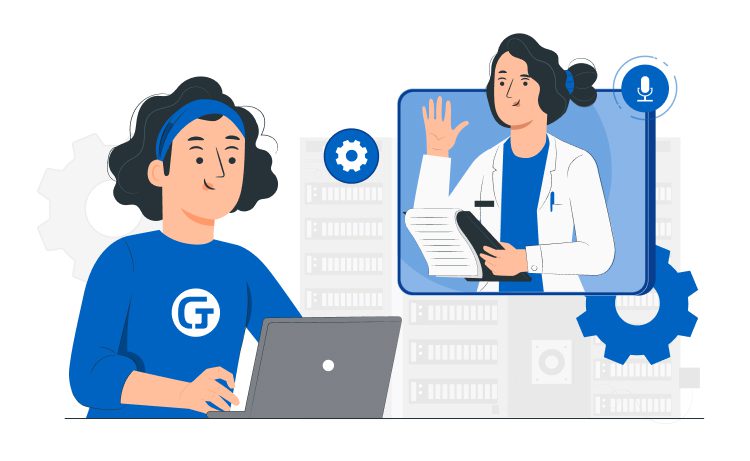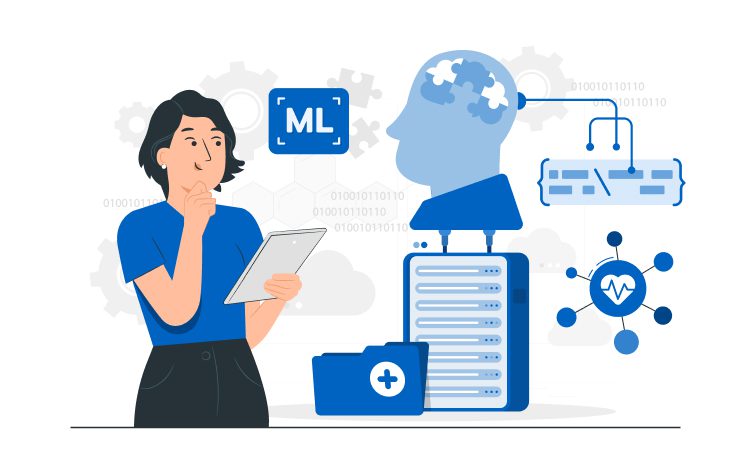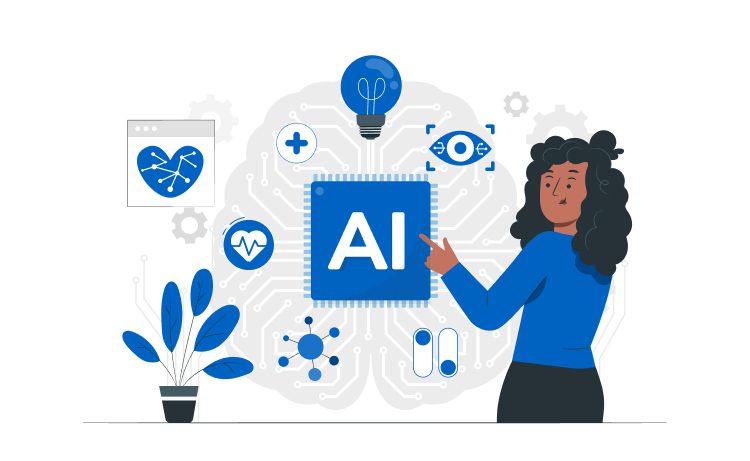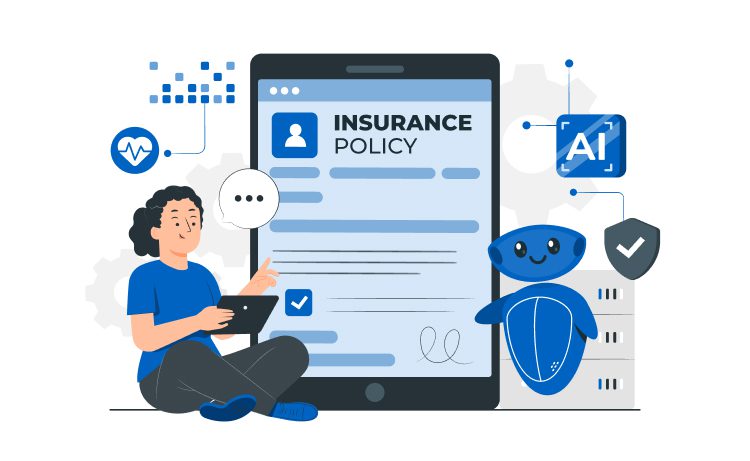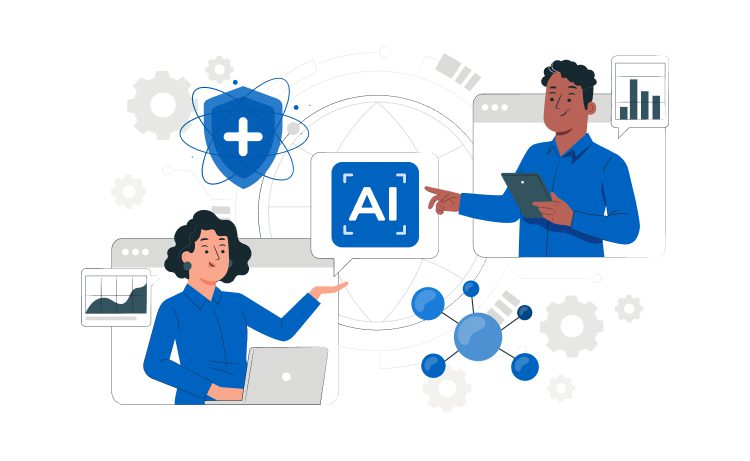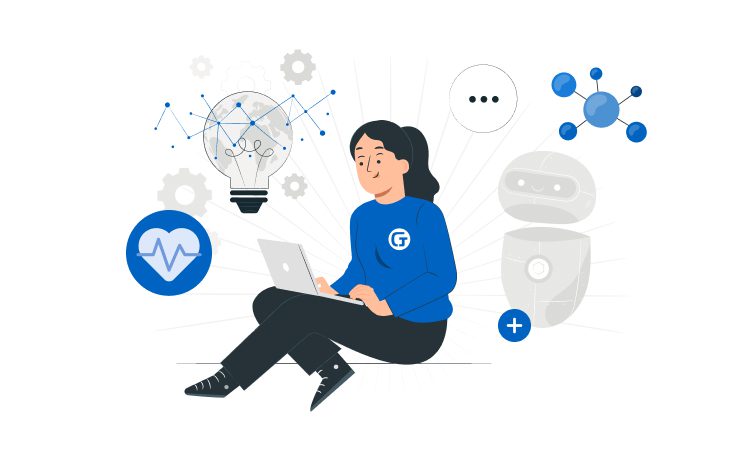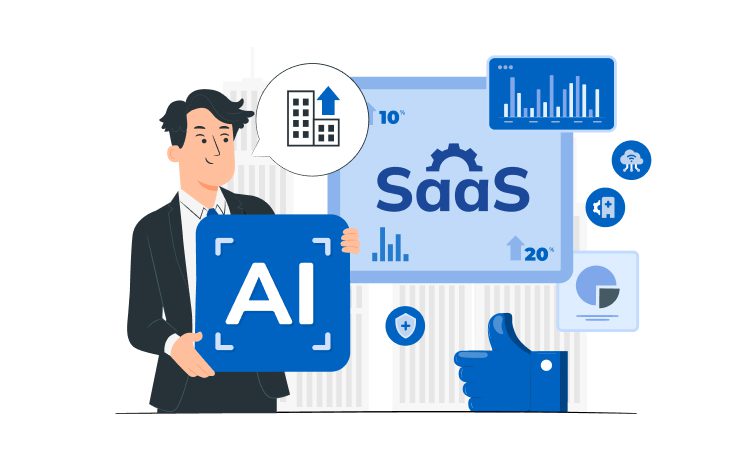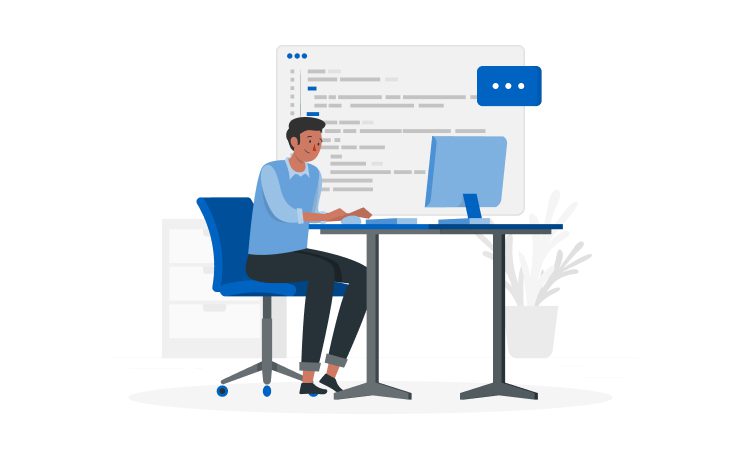
Hospital Management Software Development: Key Features and Benefits



Over the last few years, the demand for convenient medical services has increased. Along with the rapid digitization of the healthcare industry, more software systems and tools are appearing in medical institutions.
One of the most extensive all-in-one systems is the hospital management software system; in this article, we will explore SaaS-based HMS and its core benefits and features.
Hospital software development solutions automate daily operations, manage bills, documentation, and inventory, and reduce the pressure on clinicians.
So, how to create hospital management software that will fit your business perfectly? Read on and find out.
Content
At its core, HMS aims to simplify the workflow for clinicians, reduce administrative costs, diminish errors, and provide a better patient experience. However, it encompasses a wide variety of functions, as the system manages every department or branch of the hospital.
It accumulates doctors, patients, laboratory results, medical supplies, appointments, bills and insurance, and reports.
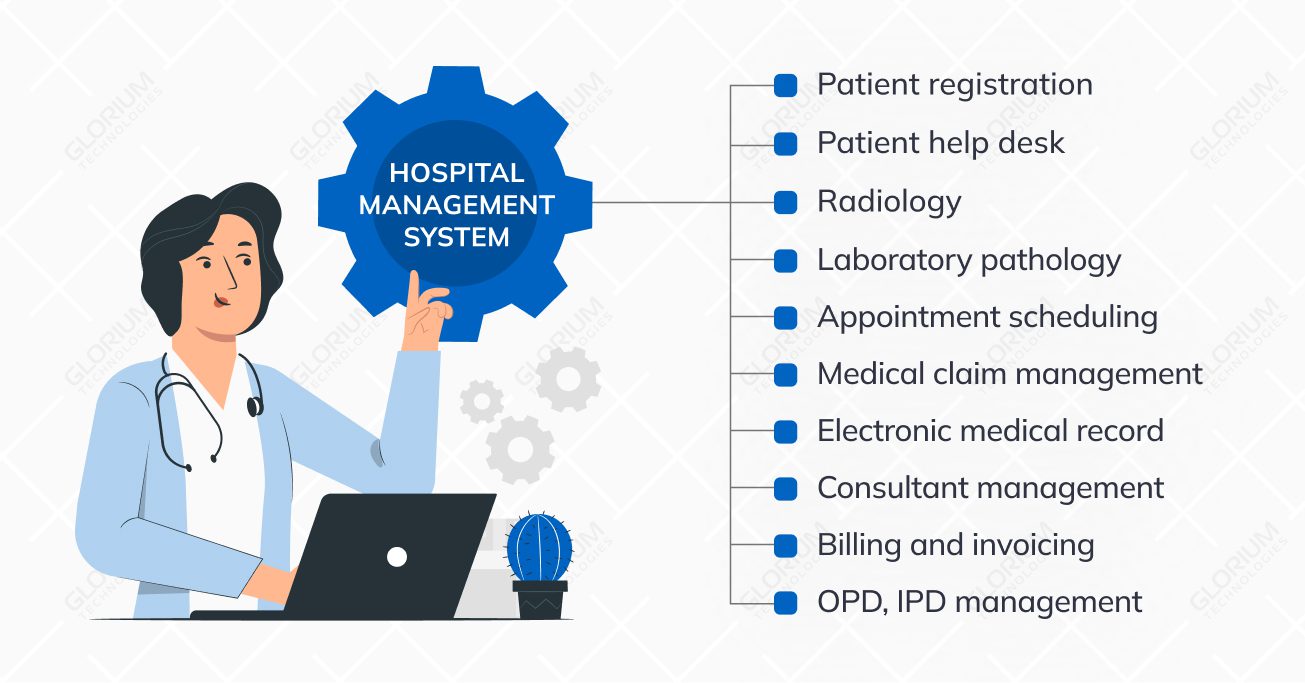
The effective distribution of resources is vital to good care and the organization’s overall well-being. A well-managed workload and efficient budgeting, in particular, allow for optimal planning of hospital performance.
Due to software with extensive scheduling capabilities, subject-based alternatives can improve doctor-patient communication. In addition, keeping track of clinical, patient, and financial data is possible if the system saves all records and transactions.
Increasing hospital administration software’s consistency, scalability, and dependability enhances patient care and experience, making a healthcare practice’s operations significantly more efficient.
Proper data management can prevent such healthcare issues as delayed care for patients who require immediate medical attention. Thus, hospital management software would improve the effectiveness and appeal of healthcare services to their key audience: doctors and patients.
A system that can manage all types of medical data, inventory, results, and reporting can significantly boost a hospital’s efficiency. In addition, the software filters data automatically, resulting in speedier operational procedures and removing time-consuming, repetitive tasks humans need to undertake.
Human errors are the second most significant cause of healthcare mismanagement, and the hospital management system dramatically minimizes this likelihood. For example, there is less likelihood of duplication, record typos, or other errors with improved data management.
How to develop a modern hospital management system? The first step towards customized hospital management software is creating and implementing features that meet the industry’s expectations. It is necessary to have a trusted hospital software development company by your side. You can learn about our healthcare software and application development solutions.
At Glorium Technologies, we take a systematic and collaborative approach to developing hospital management systems. Our team of experienced software developers, healthcare professionals, and project managers work closely with clients to understand their needs and objectives. We identify key requirements and potential challenges, and based on this information, we develop a customized software that addresses each client’s situation. Our team’s vast experience allows them to look for solutions in the unexpected places, and implement them successfully.
A German hospital approached us with the problem of the low efficiency of their bed management software. They needed help updating a frontend part for delivering better patient care. The key functional requirement was enabling the automation of booking form generation.
Given that among the solution users may be people with visual or motor impairments all the designs had to be accessible. We followed Web Content Accessibility Guidelines (WCAG) 2.0. which is a set of recommendations introduced by the World Wide Web Consortium (W3C) to make the Internet accessible to people with disabilities. So we implemented best practices of inclusive design, including changing day/night mode, display scalability, and screen narration functionality.
The project resulted in mock-ups with user-flow & multiple screens, a new responsive design with an intuitive interface, and a set of tools needed to navigate bed management.
Valentyn RiaboshtanAngular Developer, Glorium Technologies
Cloud-based systems make hospital management more flexible and scalable, enabling healthcare providers to access their software anywhere. Cloud-based systems also reduce the need for hospitals to invest in expensive hardware, making them more cost-effective. The next generation of systems will likely incorporate artificial intelligence and machine learning to improve diagnosis and treatment and blockchain technology to improve data security and privacy.
With more than ten years of expertise in health tech solutions, Glorium helps medical businesses address their current challenges and reach the market with excellent service and custom solutions. Our dedicated team helps bring your plans to life by nurturing your ideas from concept to launch.
To get an idea about the projects we deliver, you can check our approach and results in these selected case studies.
Different hospital management systems have different functionalities and are used by specialists to manage different aspects of hospital operations. For example, an EMR system is primarily used by clinicians to manage patient medical records, while a Practice Management (PM) system is used by administrative staff to manage scheduling, billing, and other administrative tasks.
The cost of different hospital management systems can vary depending on the functionalities offered and the size of the hospital.
More comprehensive systems like HIS are typically more expensive than specialized systems like pharmacy management or laboratory information systems. The cost of implementation and maintenance can also vary based on the level of customization required and the complexity of the hospital’s IT infrastructure. Here are some types of HMS:
Overall, the choice of hospital management system depends on the specific needs of the hospital, its size, and its budget. Hospitals may opt for multiple systems that integrate and work together to manage different aspects of their operations or choose a comprehensive HIS system that ties everything into one integrated platform.
The hospital management system is the mother of all medical software systems because it acts as the consolidator between all branches involved in hospital management. Usually, a hospital management system includes and manages all types of medical data, including the following:
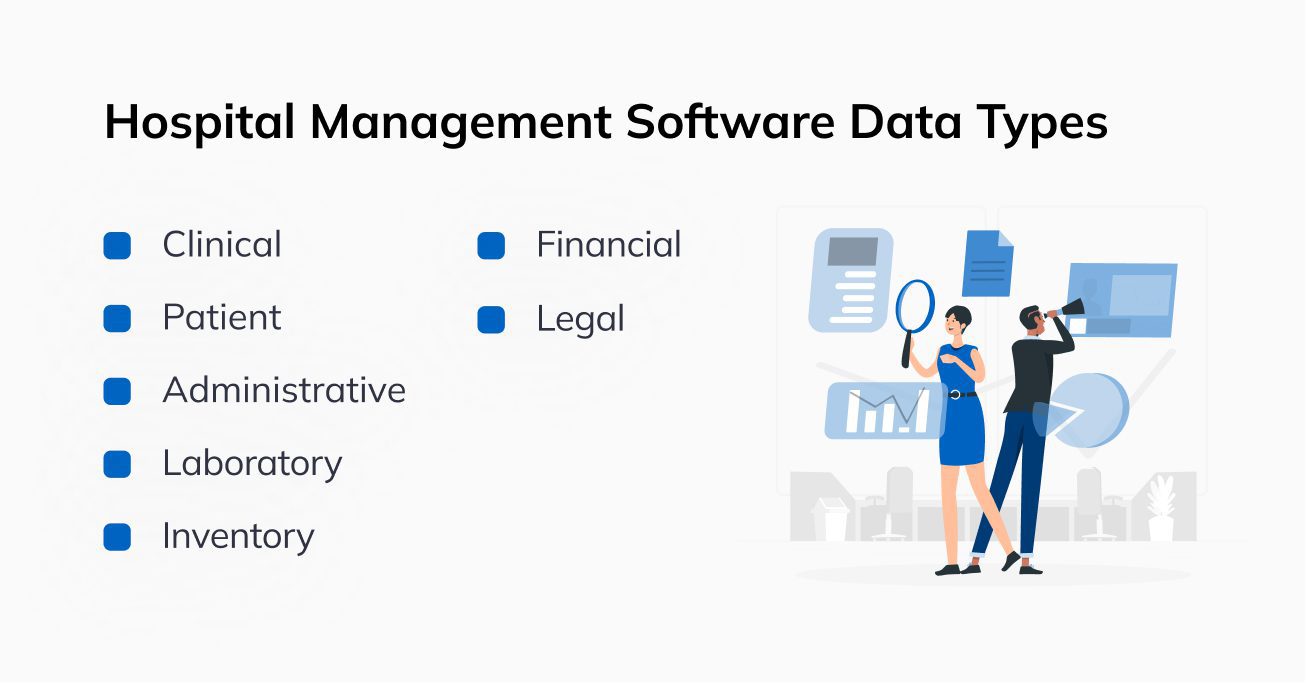
Data handling and protection are critical considerations in hospital management systems to ensure patient and hospital data confidentiality, integrity, and availability. Hospital management systems use various techniques to handle and protect information, including encryption, access control, and backup and recovery for all data types.
Strict regulatory requirements, such as HIPAA and GDPR, mandate the protection of patient data and impose penalties for non-compliance. To ensure full compliance, regular security audits and risk assessments are conducted to identify and address any vulnerabilities in the system.
Along with data types, hospital management software has systems to manage different work sectors.
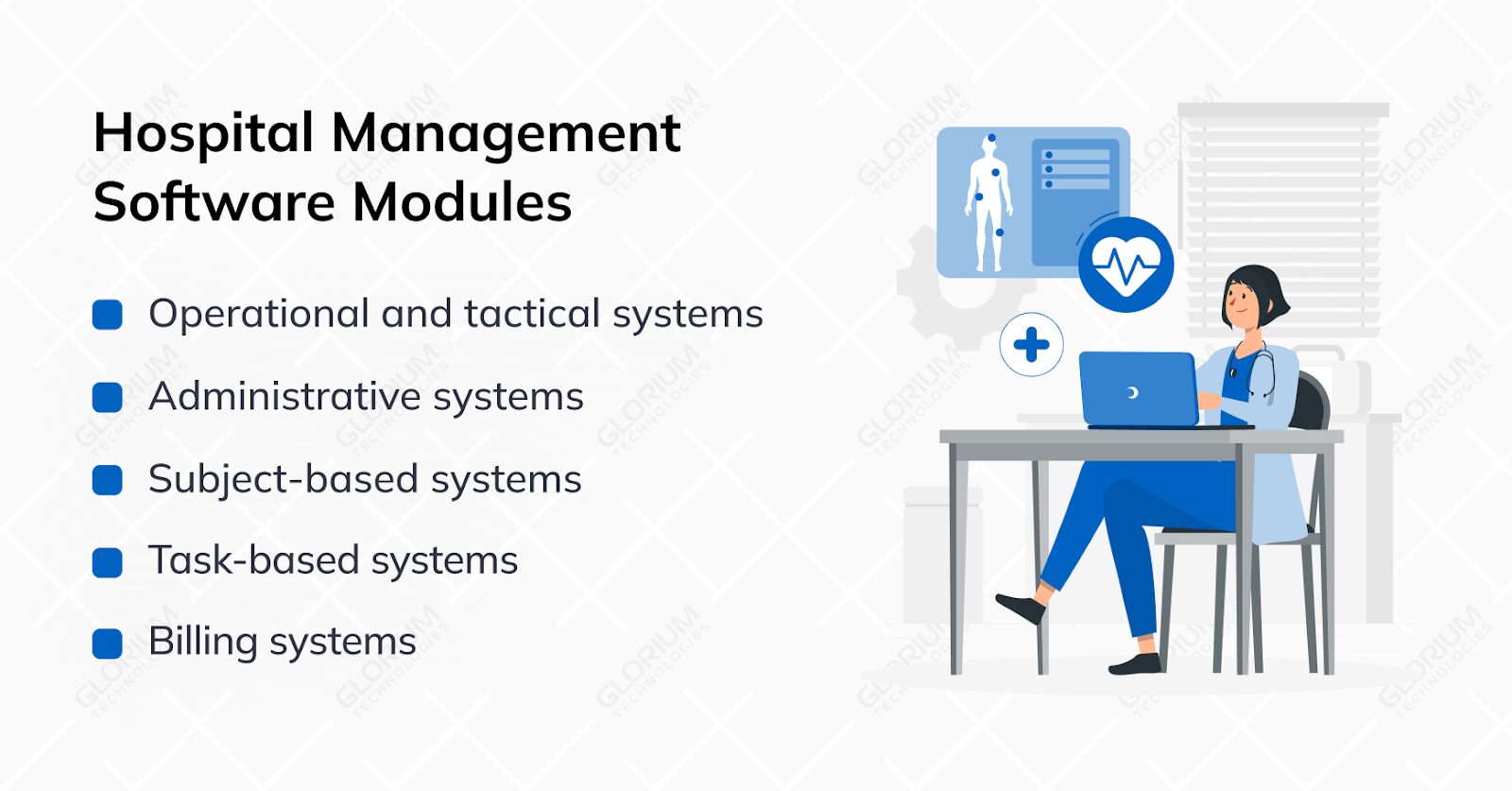
One of the general approaches for classifying medical data is an operational system. Its integration allows you to send information hierarchically, with these systems dealing with different types of medical knowledge at each level.
Operational systems enable reliable and rapid data operation and the detection of system abnormalities.
This HMS module is required for all hospitals and is responsible for supplying patient information through reports and statistics.
When the patient is released (retrospective data entry), as well as following medical assistance (to offer specifics), information is put into the system and transmitted as a report to the Department of Health (DOH).
The clinical system, which contains electronic patient records (EPRs), is built on the administrative system because administrative information connects different clinical scenarios.
Subject-based systems, often called Electronic Health Records (EHR) or Electronic Medical Records (EMR), store patient information digitally. Hospitals mostly employ them to maintain and keep a complete digital history of patients.
Compared to paper-based records, EHR and EMR help reduce data duplication because all information is in a single file that gets updated over time. These modules are typical in clinics that use Hospital Management Software.
Task-based systems are codes intended to optimize working activities’ classification. Based on the current hospital condition, an intelligent representative of this sort of system would automatically prioritize and distribute duties among personnel. Such modules concentrate on specific activities, like admissions, discharge, or transportation to an operating theater.
When creating such a system, remember that it performs worse than alternatives such as subject-based ones owing to the greater possibility of data duplication, which impacts system performance, disk space optimization, and the nature of data array storage.
Billing systems are in charge of monitoring and managing the hospital’s finances. The tagging of different outputs from healthcare management systems with the associated pricing allows for the tracking of patient costing.
Most costing comes from analyzing the previous year’s expense distribution. Such systems’ capacity to charge and regulate payment/non-payment is essential.
Thus, billing systems are crucial for optimal financial performance in hospitals.
Developing a hospital management system involves incorporating several essential features that streamline operations. These include but are not limited to, electronic medical records (EMR), patient management, inventory management, billing and payment processing, and reporting and analytics.
One of the HMS features is the ability to manage test results and patient data. Interaction with other lab systems improves workflow efficiency and data accuracy and adds value to the patient treatment cycle.
Results management can include sample tracking, quality assurance, reporting, and other activities. The HMS system integrates with laboratory systems, collects needed data, and sorts it in the design, layering it with additional patient information if required.
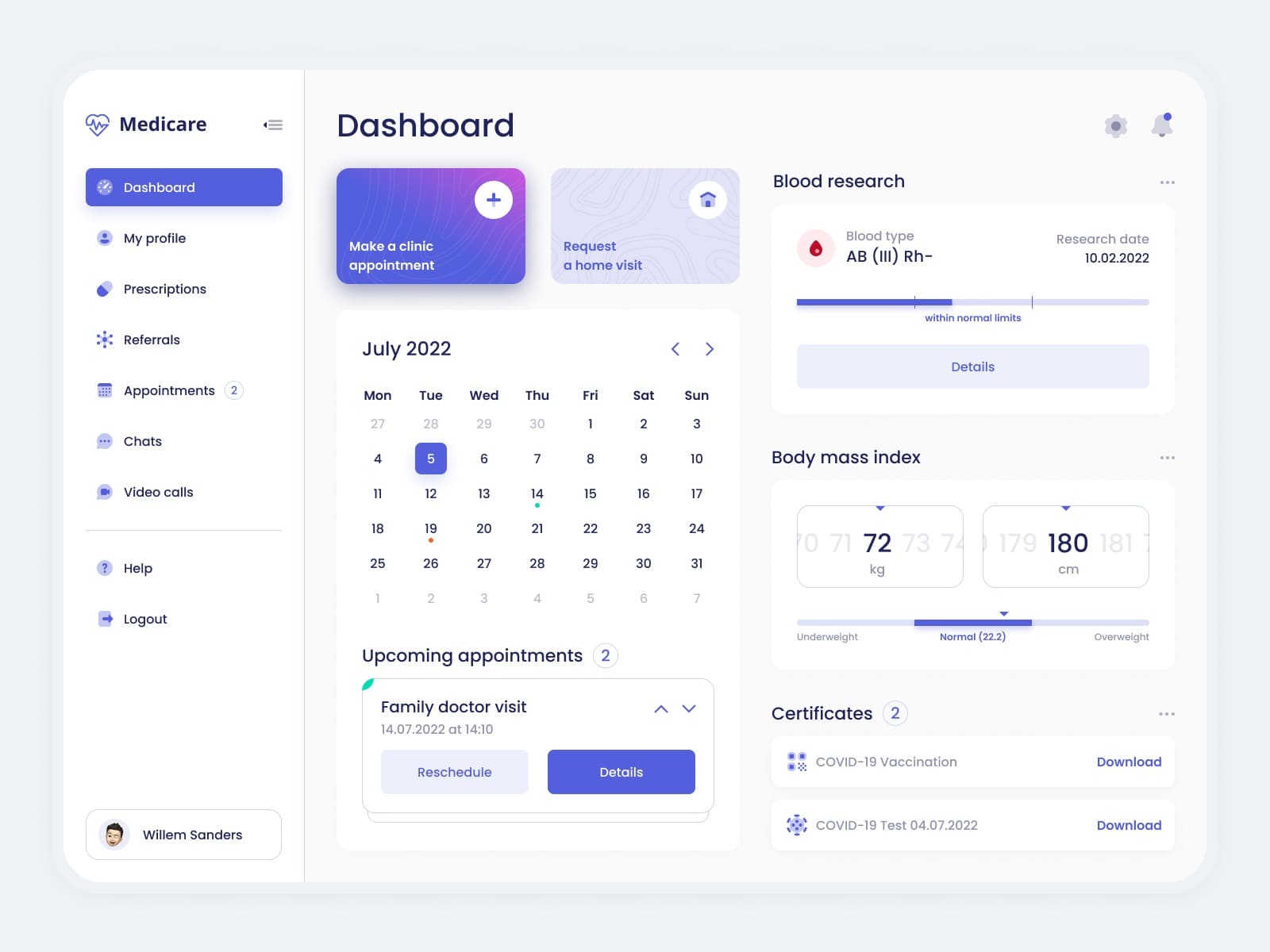
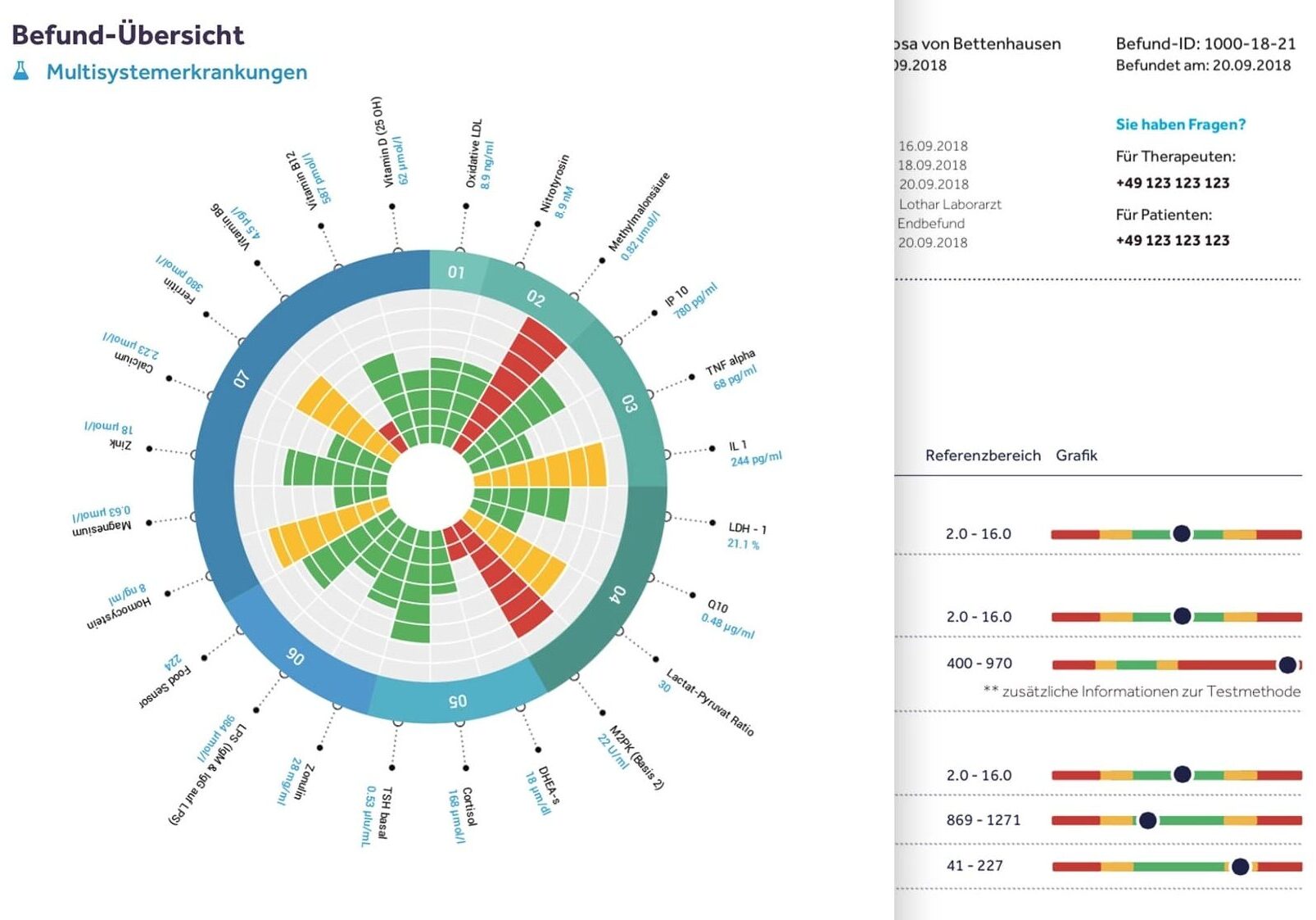
Image source: Pawel Malenczak, Fireart Studio
EMR software is a consolidated data hub that stores all critical patient information, such as health records, visits, vaccines, medications, doctor’s notes, etc.
As healthcare solutions evolved, the core set grew with new and updated features and functions.
However, with the global pandemic and increased digitization of the healthcare industry, the system will require streamlined, integrated, secure, and high-performing EHR and billing software.
Image source: RonDesignLab, Seven Metrics
Healthcare solution developers frequently overlook the patient’s side of the payment process. A range of convenient and functional payment options alleviate many bottlenecks in the healthcare system, reduce manual and administrative work, and boost the medical enterprise’s credibility.
Another vital function is insurance eligibility verification, which keeps track of whether or not the insurance has expired and what services it covers. RTE is a patient eligibility system implemented into medical billing software.
It enables real-time digital verification of a patient’s insurance coverage, effectively determining whether or not the insurance provider is operating legally.
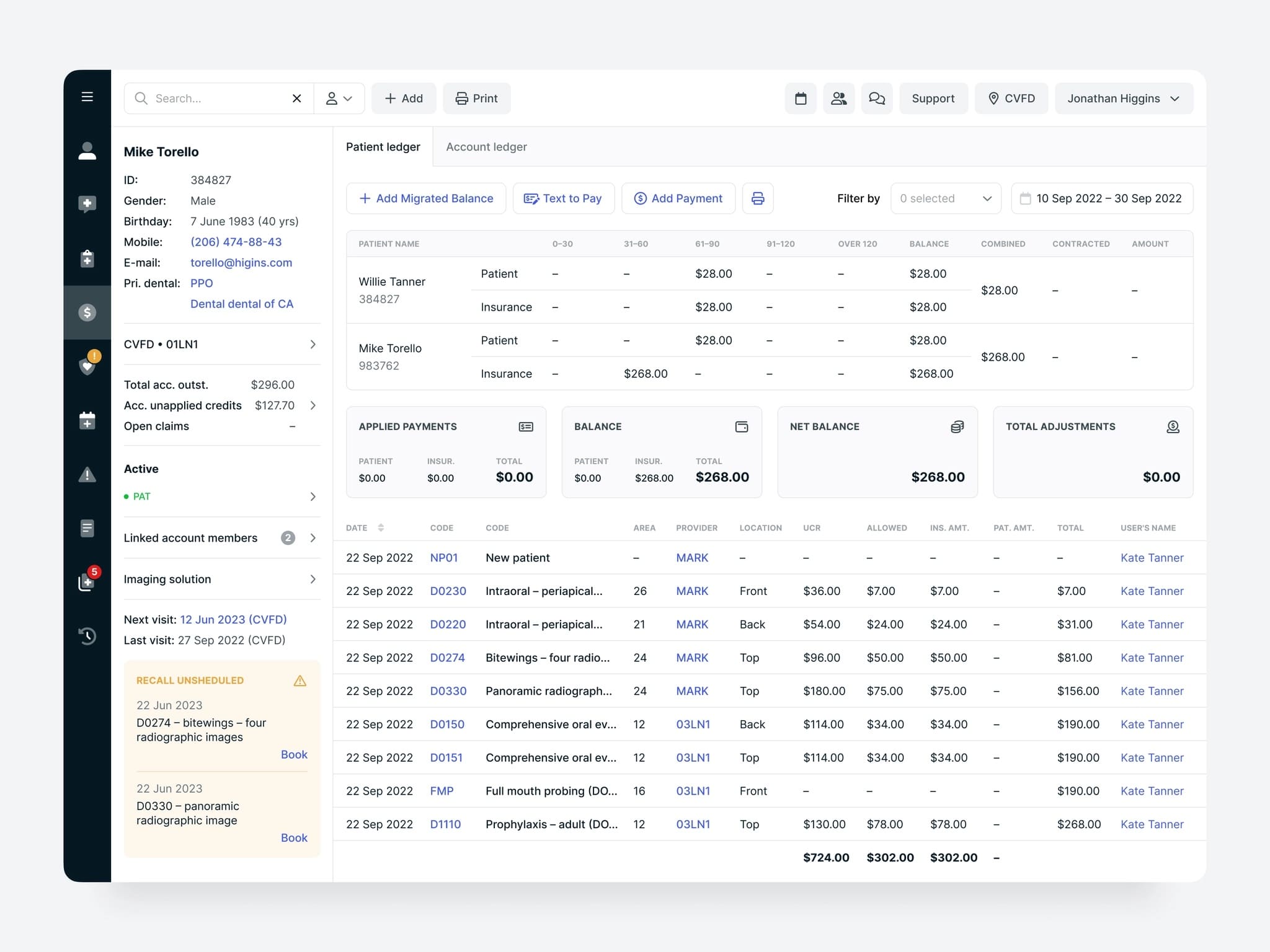
Image source: Seven Metrics
Well-designed hospital management software includes many scheduling options to assist physicians and patients in communicating more effectively. With all the visits logged in the system, you can keep track of the appointment history and the doctor’s notes.
In addition, the same platform provides reminders, follow-ups, and alerts when lab results arrive and recommends scheduling an appointment as necessary.
Image source: Divan Raj, NickelFox Design
The health tech industry is quickly growing, with a noticeable increase in patient-targeted applications and products. As a result, mobile healthcare apps are an essential component of the hospital’s life cycle.
A well-integrated application may bridge the gap between the user and technology, significantly improving the customer experience.
In a healthcare setting, simple and functional application design advantages extend beyond the obvious and help faster and more effective illness treatment.
A simple interface and enhanced functionality can alleviate patients’ worries, dramatically improve their medical experiences, bolster treatment efficiency, and even prevent disease development.
Healthcare providers require intelligent reporting in their hospital management systems to better understand procedures and detect performance gaps. In addition, leveraging massive amounts of data allows for more accurate financial statistics.
Hospital management software uses cognitive analytics to identify areas of concern, such as overspending, a lack of data, payment failure, or something else. It should also provide insights and ideas on improving the patient experience.
Tools like the fastest form builder come in handy if there is a need to automate collecting patient data for better data analysis.
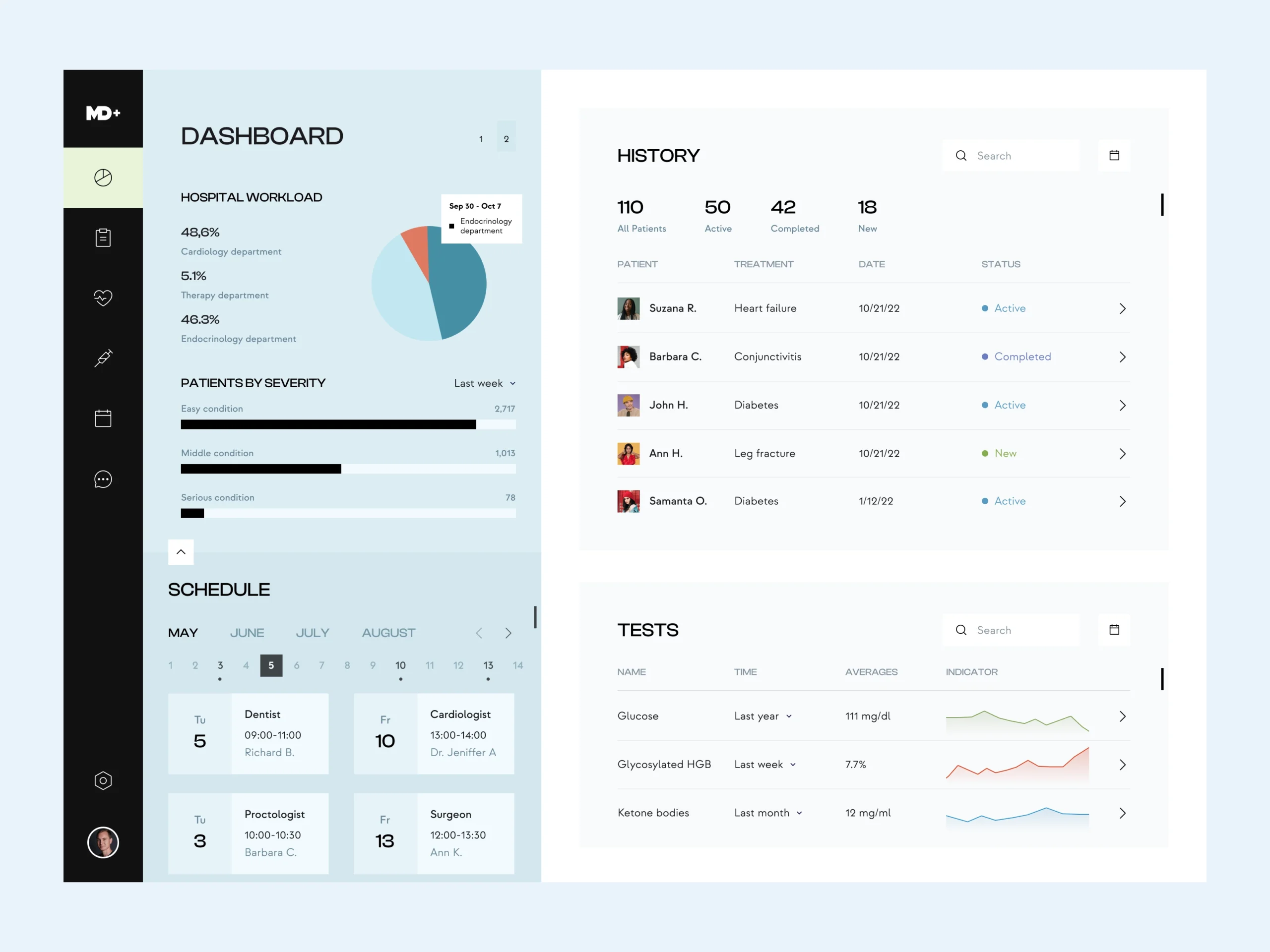
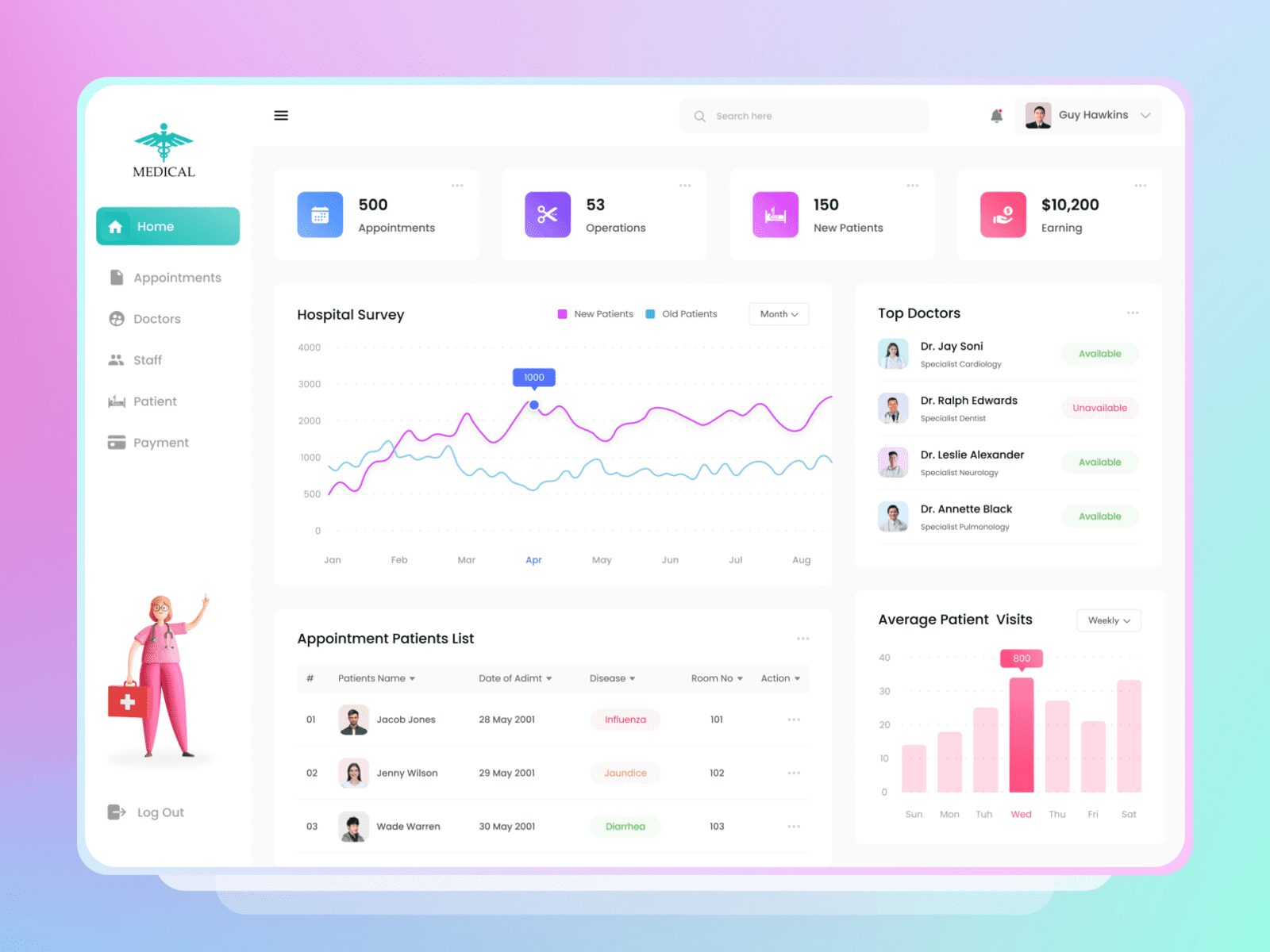
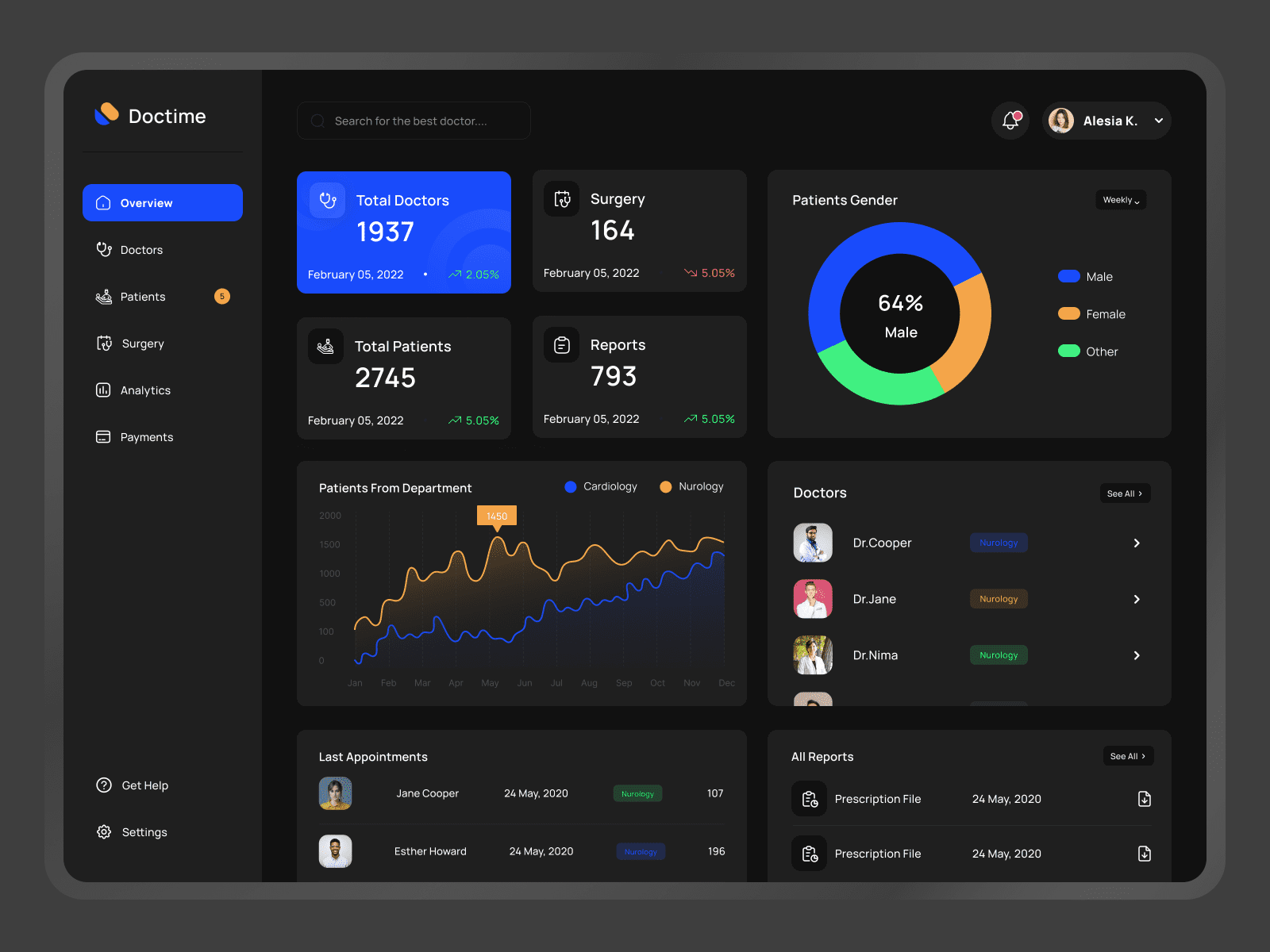
Image source: Nehal Hamim, Md Abadul Biswas, Ledo
Any health service is strongly linked with pharmaceutical companies, and the capacity to prescribe and request pharmaceuticals is a feature that most doctors and patients will seek.
It eliminates the time-consuming manual prescription process and ensures treatment safety and compliance. The following features are typically included in digital order management:
When a patient receives several drugs, a significant contribution of a software solution would recognize which components conflict with each other and send automatic warnings and recommendations. This solution also ensures compliance and discovering any problems when receiving prescribed medications.
The technologies used to develop hospital management software include programming languages such as Java, Python, and C++, databases such as MySQL and Oracle, and web development technologies such as HTML, CSS, and JavaScript.
The development time for hospital management software depends on the complexity of the project, the features required, and the development methodology used. Typically, it can take anywhere from a few months to a year or more to develop hospital management software.
The cost of developing hospital management software depends on several factors such as the complexity of the project, the features required, the development team’s location, and the development methodology used. Generally, it can cost anywhere from tens of thousands to hundreds of thousands of dollars or more.
To ensure the security and privacy of patient data in hospital management software, the development team should follow industry best practices such as data encryption, access control, user authentication, and regular data backups. The software should also comply with applicable laws and regulations such as HIPAA and GDPR.

